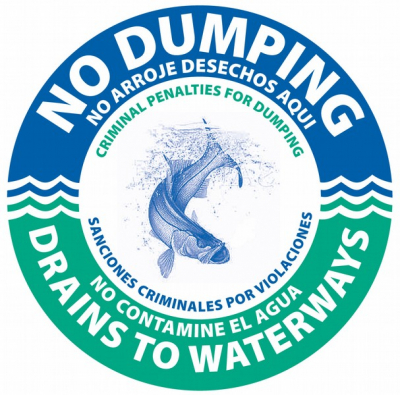Protect Our Natural Floodplain
Maintenance of these systems is very important. Debris in the swales, catch basins and pipes obstructs the flow of water causing overflow on to the roads and into yards. Partial or complete filling of these storm sewer systems reduces the flood flow capacity and results in flooding of streets and yards. The City must maintain these systems to an adequate flow capacity. To achieve this, the City's Streets and Stormwater Department has formalized its storm sewer system maintenance procedures. The City's stormwater crew maintains the drainage system on a daily basis. Activities include street sweeping, pipe cleaning and repair, sump debris removal, drain inlet clearings, swale contouring, lake maintenance and other associated duties.
Swales shall not be paved, regraded or altered prior to checking with the Streets & Stormwater Department. For more information on maintaining swales click here.
Several of the City's efforts depend upon the community's co-operation and assistance. If you observe excess debris in ditches, swales, lakes, canals or a storm sewer catch basin, please contact the Streets & Stormwater Department . (239-213-5000)
It is also important to properly dispose of chemicals, litter and debris so it does not enter the drainage system. The water entering storm drains does not get treated before entering the canals and lakes within the City. Polluted stormwater entering our drainage system is harmful to plants and animals. Common types of stormwater pollutants include chemicals (detergents, paint, automotive fluids, fertilizers), litter (cans, plastic bags and bottles, cigarette butts), and debris (leaves, lawn and garden clippings, animal excrement).
If You Witness Illegal Dumping or Littering
It is illegal to dump garbage, refuse, vegetative debris, pollutants and contaminants and other debris into waterways and natural areas. Such irresponsible acts can obstruct drainage and create significant health, safety and environmental hazards.
Violators are subject to strict civil and legal actions.
State of Florida Illegal Dumping Statutes
• Florida Statute 298.66 Obstruction of public drainage canals, etc.., prohibited;
• Florida Statute 403.073 Pollution Prevention
• Florida Statute 386.041 Nuisances injurious to health
Local Ordinance
• Section 42-2 Depositing effluvia or refuse in waters
• Section 42-5 Control of pollutant discharge
• Section 30-157(j) Discharge of septic tanks into sewer system
• Section 16, Article IV Floodplain Management Ordinance
Please report violators to the Code Enforcement Department via email or by phone at 239-213-5030.

